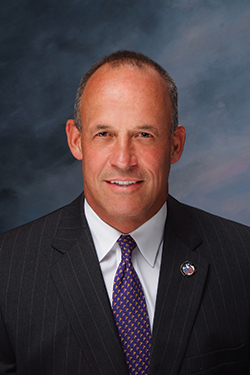
It would be difficult not to notice that Caterpillar recently celebrated its 100th anniversary in the Peoria area. One of the reasons Cat has grown and prospered over the years—in good times and bad—is that they continually reinvent and improve themselves. A friend of my family worked at Cat in the 1950s and ‘60s. This was when Mr. Louis Neumiller headed the company. I remember this friend talking about how they keep starting new programs to inspire greater industrial and manufacturing success and efficiency. In particular, he mentioned something called “ITABWODI.” I forgot about this until a few months ago when I was working on my State of the City address. Why did it come to mind?
“ITABWODI” was the acronym for “Is there a better way of doing it?” And it came to mind because we simply must find a better way of doing the business of municipal government. With ongoing financial challenges and budget shortfalls, coupled with citizen expectations of quality public services without tax increases, we have to find that “better way.” We cannot keep reducing staff levels and reshuffling our organizational chart and expect to maintain essential public safety, public works and all the other crucial city services.
And it is no secret that other local government agencies are experiencing the same challenges. Peoria County does a great job of running their business, but they have similar financial constraints to ours. Our neighboring villages and cities are in the same boat. All of this made me think that we should take a page out of Cat’s book and find that better way.
For some of the more dynamic communities in our country, that better way has been a unification of local governments (“Unigov”)—mostly the host county and its municipalities. I cited the examples of Indianapolis; Lexington and Louisville, Kentucky; and Kansas City. Are there differences between us and these areas? Sure, but the similarities are dramatic. These include the desire of elected officials to accomplish greater operational efficiencies and maintain quality services within an affordable (and competitive) tax structure.
I like to think in terms of partnerships. And we’ve worked diligently with Peoria County to look at sensible ways of sharing some services and giving our common taxpayer base more bang for the buck. County Board Chairman Tom O’Neill and I agreed that we should start looking at the feasibility of a Unigov-type approach for the City of Peoria and Peoria County. We proposed the creation of a study group to dig deeply into the subject and come up with some answers to that question: Is there a better way of doing it?
We intend to name that study group in the next few weeks. The process of carefully examining what Unigov is all about—the pluses and minuses—will take time. I have no preconceived notion of what the study group will or should conclude. Some of my friends in the community suggest I may have a hidden agenda. My only agenda is very transparent and plain: to do a better job of leading our local governments in a manner the taxpayer can afford and that makes us more competitive with our peer communities elsewhere.
Over the past few weeks I’ve asked people what comes to mind when they hear the term “Unigov.” Admittedly, this is not scientific, but the five most common responses are:
- A great opportunity to streamline services
- It will never happen.
- Why not include other units of local government in Peoria County?
- Will it actually save money?
- We had better find the best practices in other places that have done this.
All of these responses are fair game, and this is why we need to carefully, objectively and calmly look at the feasibility of some type of amalgamated city and county structure and service delivery system.
In our type of city government, with a city manager running the day-to-day operations of the city, it presents the mayor with the task of looking at longer-term policy opportunities for improving the community. While it is an overused term, “quality of life” is so important for a community like ours as we compete with others for economic development, growth and greater prosperity. That is why I spend time worrying about how to help improve our public education system, how we can strengthen our transportation and telecommunications network (the Google initiative, for example), and how we can provide our services more efficiently.
Is there a better way of doing it? I think so. What that better way turns out to be is the $64,000 question, and that is why I am forming a study group to delve into Unigov and what it might offer for us. If you want to help, let me hear from you. We just might make it better! iBi

